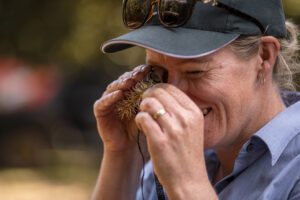
A collaborative approach for pest and disease management
Supplied by Hort Innovation Australia
In October 2021, Hort Innovation hosted a two-day workshop for the macadamia industry to discuss integrated pest and disease management. The workshop brought together macadamia growers, key industry stakeholders and delivery partners to:
- Review the current macadamia pest management program
- Engage the macadamia industry in shaping the next iteration of the macadamia pest management program
- Identify key priorities for pest management in macadamia
The workshop was a major success and an excellent example of collaboration between Hort Innovation and key macadamia stakeholders, including twenty-two macadamia growers and consultants.
The stakeholders involved in leading the event were:
- Corrine Jasper (Hort Innovation Head of Industry Strategic Partnerships), Kathryn Young (Hort Innovation R&D Manager) and Olive Hood (Hort Innovation Regional Extension Manager) who provided a strategic direction for the workshop.
- Leoni Kojetin and Chris Searle from the Australian Macadamia Society coordinated the workshop and provided the macadamia industry perspective.
- Araz Solomon (Hort Innovation R&D Manager for Integrated Pest and Disease Management) chaired the workshops and provided his expertise on entomology and pathology.
A key part of the workshop was a discussion on macadamia growers’ needs and concerns about integrated pest and disease management, which were distilled into a ‘wish list.’ Through discussion, this ‘wish list’ was then converted into research targets based on industry priorities and available levy budget. The priorities were then developed into a multidisciplinary pest management program which Hort Innovation contracted on behalf of the macadamia industry.
An integrated systems-based approach for pest management in Australian macadamia (MC21000) aims to establish a decision support system to facilitate timely and effective pest management decisions for the Australian macadamia industry. This will suppress populations of key insect pests under an economic threshold, ensuring sustained and improved orchard health and productivity. The main value proposition this project offers, is the modelling component which has the capability to integrate data from past, current and future projects to support decision-making to control pests in macadamia.
Meet Megan Boote, Grower Services Manager for Suncoast Gold Macadamias, who says, “I was involved in the workshop held in Bundaberg in October 2021, where we were asked to rank the priorities for future integrated pest and management R&D for the macadamia industry.
Participants included pest-focused consultants and grower representatives working in the Queensland macadamia industry, and we had the opportunity to hear from some key research stakeholders on the progress of their projects.
The main priority identified by the group was pest ecology and biology. We identified that large scale trials were needed to better understand the lifecycle, breeding and feeding patterns of the industry’s most destructive pests, primarily fruit spotting bug, seed weevil and lacebug. We discussed the questions we’d like answers to, such as “What controls population expansion?”, “Is there a relationship between tree health, nutrition or growth stage and pest incidence?”, and “What is the relationship between temperature, humidity and changing climate and the growth and feeding patterns of the pests?””
The outcomes of such research should then be used to develop evidence-based tools to more accurately and efficiently predict and control pests. The group thought tools such as predictive models of insect populations, updated risk matrix and economic control thresholds were a high priority.
The group agreed that more work on cultural, biological controls and beneficial insects already used was needed. We also identified a need to continue the work in finding new or novel solutions from this sector that could help our industry in the future.
As has been discussed at many macadamia industry consultant meetings, we identified a need for localised extension groups to promote information sharing, upskilling, and to strengthen local and regional ties between growers, consultants and researchers so that we can better deal with new and existing pest threats.
Main photo: Megan Boote, Grower Services Manager for Suncoast Gold Macadamias
